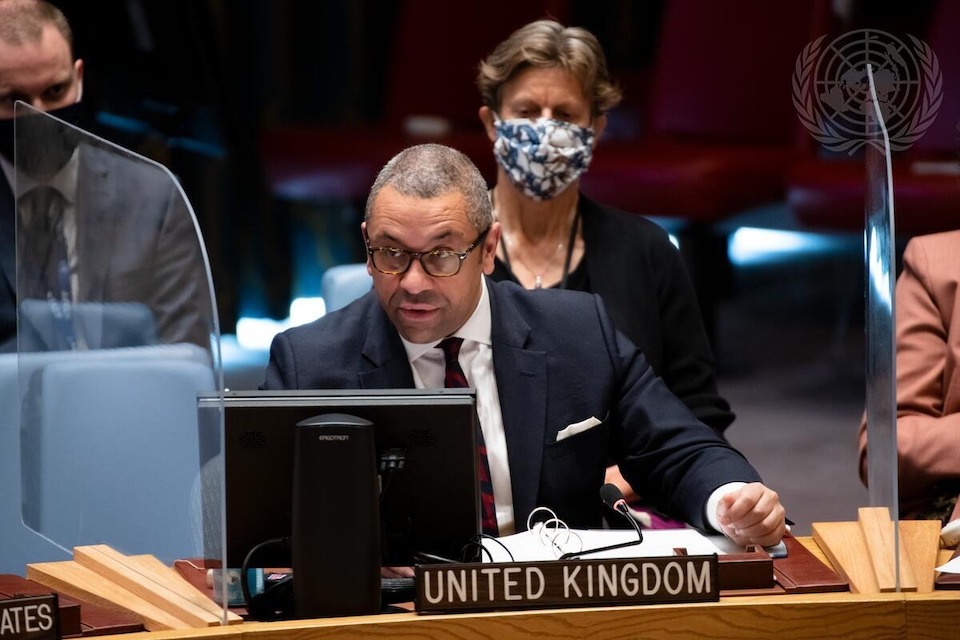We urge Russia to match its words with actions: Minister Cleverly's statement at the UN Security Council
James Cleverly, Minister for Europe and North America, gave a statement at the United Nations Security Council briefing on the crisis at Ukraine's border.

I thank you and I thank the briefers for the information that they’ve given today. The United Nations, the OSCE, and the mandate of the OSCE Special Monitoring Mission continue to command our full support. The rights of all Ukrainians, whether they are in Kyiv, Lviv, Donetsk or Luhansk, can only be served by peace, diplomacy, and dialogue.
I want to make absolutely clear the United Kingdom’s support for implementation of the Minsk agreements, as endorsed by UNSC resolution 2202. That resolution reaffirmed the Security Council’s full respect for the sovereignty, independence and territorial integrity of Ukraine.
It remains the responsibility of all parties to implement fully their commitments and seek a peaceful resolution of the conflict.
In this respect, we condemn the actions taken by the Russian Duma to propose that the Russian President recognise the regions of Luhansk and Donetsk as independent. This would directly undermine the Minsk agreements and must be rejected by the Russian authorities, in line with the commitments that they have made.
We welcome all efforts to support the process and avoid escalation, including the role of the OSCE and the Normandy format.
This remains our long-standing position.
Mr President, let us remind ourselves of the context for the Minsk agreements, and the situation in which Ukraine finds itself today:
In March 2014, Russia invaded and illegally annexed Crimea, in flagrant violation of international law.
A few weeks later, in April, Russia instigated a conflict in the Donbas, which it continues to fuel today.
More than 14,000 have died in the fighting there.
Now, today, the Ukrainian people are yet again living under threat of invasion with well over 100,000 Russian troops, heavy weaponry, and military vessels amassed and exercising on their northern, eastern and southern borders, from Belarus to the Black Sea.
Let us say clearly what the world can see:
Russia has deployed the forces necessary to invade Ukraine, and now has them readied them for action.
In the past days we have heard Russian claims that some units are returning to barracks. It is, however, all too clear that the opposite is in fact true, and the Russian military build-up continues.
Russia will say it has the right to move its forces on its own territory, but no one has the right to threaten the use of force. Russia is patently failing to live up to the international commitments it has made around military transparency, by refusing to adequately explain its military build-up or provide the necessary transparency to build trust and de-escalate the situation.
If the Kremlin is serious about a diplomatic resolution then it needs to show up to diplomatic meetings and commit to meaningful OSCE talks, including via Chapter 3 of the OSCE Vienna Document. They did not show up on Wednesday, and do not intend to show up on Friday.
Russia’s actions are clearly designed to intimidate, threaten and destabilise Ukraine. We know it, they know it, and the international community knows it.
Mr President, Russia called this meeting today to discuss resolution 2202.
That text is very clear on 2 points that reflect the core tenets of the Charter emphasised by the UN Secretary-General when he addressed this situation only a few days ago:
-
that resolving the situation in the eastern regions of Ukraine can only be achieved through a peaceful means, and
-
that there must be full respect for the sovereignty, independence and territorial integrity of Ukraine
Yet we are seeing increasing disinformation about events in the Donbas that are straight out of the Kremlin playbook: a blatant attempt by the Russian Government to fabricate a pretext for the invasion of Ukraine.
It is therefore clear that we are at a critical juncture to prevent further escalation.
Upholding the core tenets of the Charter in respect of peaceful resolution and respecting sovereignty and territorial integrity has never been more important.
Russia must now engage with the diplomatic processes we have built up over several decades, and on which global security depends, to resolve the situation through peaceful means.
If Russia chooses to launch an attack at this time of heightened tension, using disinformation as a pretext, it will show that Russia was never serious about diplomatic engagement.
Any Russian invasion now would be a conflict of choice for President Putin, and an abdication of Russia’s responsibility under the UN Charter to refrain from the use of force and to maintain international peace and security.
There should be no doubt that any further Russian incursion into Ukraine would be a massive strategic mistake, and a humanitarian disaster, that will be met with strength, including significant coordinated sanctions. And we will continue to call out the pattern of deception and disinformation from the Russian state.
If Russia is serious about the Charter and its role as a permanent member of this Council:
- it should give the Minsk agreements the chance to be implemented, free from coercion
- it should engage seriously with diplomacy
- and it should stand down all its troops
There is still time to change path. Conflict can be avoided.
We urge Russia to match its words with actions, to withdraw its troops, to engage in meaningful talks and to act in the best interests of peace, security and stability in Europe.
I thank you.